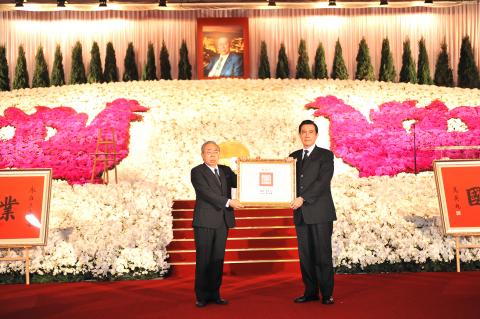Formosa Plastics Group (FPG, 台塑集團) yesterday held a funeral for cofounder Wang Yung-tsai (王永在), that drew many key political and business figures.
President Ma Ying-jeou (馬英九) made a statement praising Wang for building the group’s production base in Yunlin County’s Mailiao Township (麥寮), which helped boost the nation’s petrochemical industry, generate tax income and create jobs.
Vice President Wu Den-yih (吳敦義), Legislative Speaker Wang Jin-pyng (王金平) and Minister of Economic Affairs John Deng (鄧振中) attended the ceremony, as well as Democratic Progressive Party (DPP) caucus whip Ker Chien- ming (柯建銘) and former DPP chairman Su Tseng-chang (蘇貞昌).

Photo courtesy of Formosa Plastics Group
Wang passed away on Nov. 27. at the age of 93. He was a younger brother of Wang Yung-ching (王永慶), the other founder of the group. The younger Wang was dubbed “the grand architect” of the group’s production site in Mailiao — which encompasses the nation’s sixth naphtha cracker, an oil factory, a power plant and a harbor — because he supervised its construction, which started in 1994, according to the group.
“Wang [Yung-tsai] was a person who always quietly finished what had to be done and never asked for fame,” Chinese National Federation of Industries (CNFI, 全國工業總會) chairman Rock Hsu (許勝雄) said.
HTC Corp (宏達電) chairwoman Cher Wang (王雪紅), a niece Wang Yung-tsai, said that he devoted all his life to Taiwan and to the group, and his diligence is worth emulating.
Formosa Plastics Group chairman William Wong (王文淵), Wang Yung-tsai’s son, said he learned how to run a company from his father, who used to spend several hours at weekends discussing corporate management with Wong, and sharing his experience restructuring Formosa Chemicals & Fibre Corp (台灣化學纖維) and Nan Ya Plastics Corp (南亞塑膠).
Wong said he would live up to his father’s expectations and complete all of the group’s important projects.

Macronix International Co (旺宏), the world’s biggest NOR flash memory supplier, yesterday said it would spend NT$22 billion (US$699.1 million) on capacity expansion this year to increase its production of mid-to-low-density memory chips as the world’s major memorychip suppliers are phasing out the market. The company said its planned capital expenditures are about 11 times higher than the NT$1.8 billion it spent on new facilities and equipment last year. A majority of this year’s outlay would be allocated to step up capacity of multi-level cell (MLC) NAND flash memory chips, which are used in embedded multimedia cards (eMMC), a managed

CULPRITS: Factors that affected the slip included falling global crude oil prices, wait-and-see consumer attitudes due to US tariffs and a different Lunar New Year holiday schedule Taiwan’s retail sales ended a nine-year growth streak last year, slipping 0.2 percent from a year earlier as uncertainty over US tariff policies affected demand for durable goods, data released on Friday by the Ministry of Economic Affairs showed. Last year’s retail sales totaled NT$4.84 trillion (US$153.27 billion), down about NT$9.5 billion, or 0.2 percent, from 2024. Despite the decline, the figure was still the second-highest annual sales total on record. Ministry statistics department deputy head Chen Yu-fang (陳玉芳) said sales of cars, motorcycles and related products, which accounted for 17.4 percent of total retail rales last year, fell NT$68.1 billion, or

In the wake of strong global demand for AI applications, Taiwan’s export-oriented economy accelerated with the composite index of economic indicators flashing the first “red” light in December for one year, indicating the economy is in booming mode, the National Development Council (NDC) said yesterday. Moreover, the index of leading indicators, which gauges the potential state of the economy over the next six months, also moved higher in December amid growing optimism over the outlook, the NDC said. In December, the index of economic indicators rose one point from a month earlier to 38, at the lower end of the “red” light.

MediaTek Inc (聯發科) shares yesterday notched their best two-day rally on record, as investors flock to the Taiwanese chip designer on excitement over its tie-up with Google. The Taipei-listed stock jumped 8.59 percent, capping a two-session surge of 19 percent and closing at a fresh all-time high of NT$1,770. That extended a two-month rally on growing awareness of MediaTek’s work on Google’s tensor processing units (TPUs), which are chips used in artificial intelligence (AI) applications. It also highlights how fund managers faced with single-stock limits on their holding of market titan Taiwan Semiconductor Manufacturing Co (TSMC, 台積電) are diversifying into other AI-related firms.